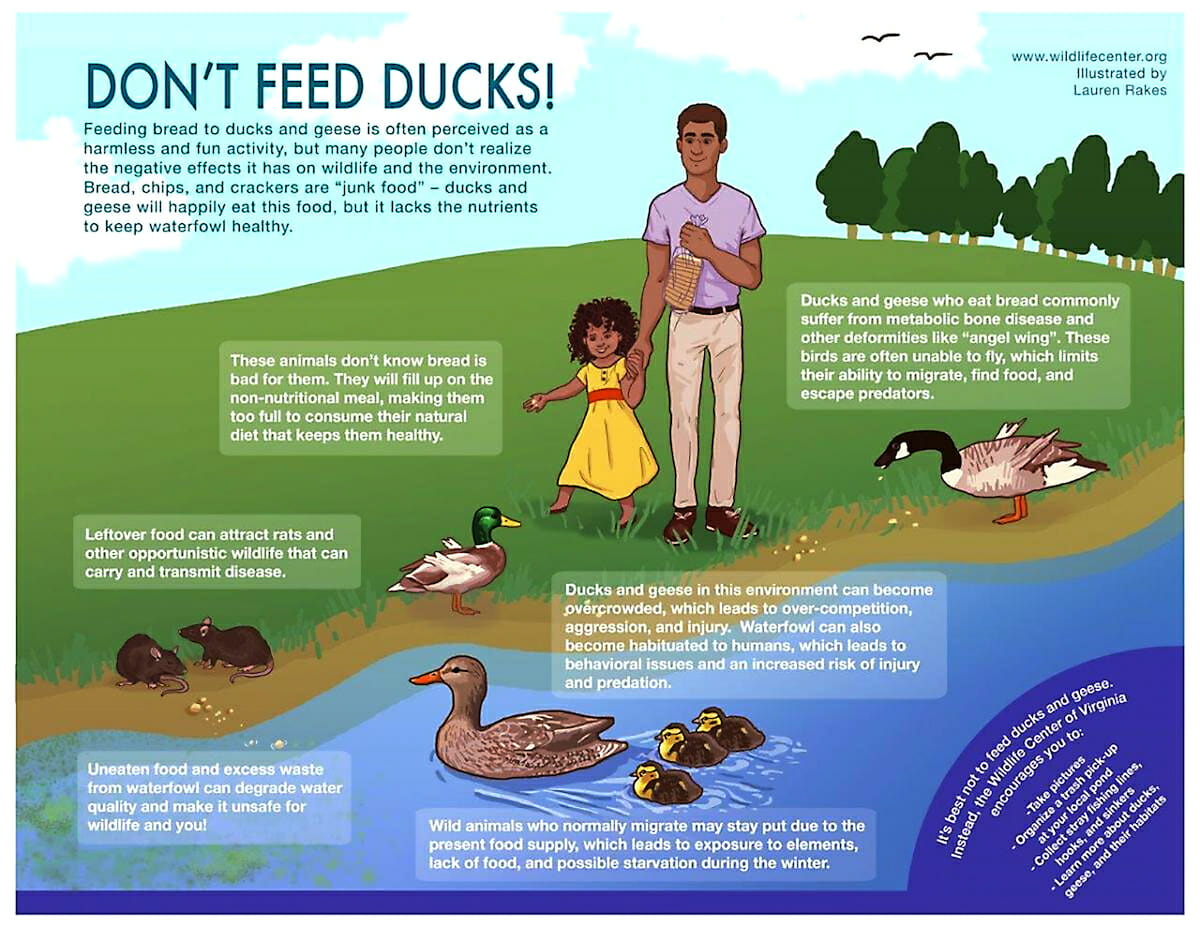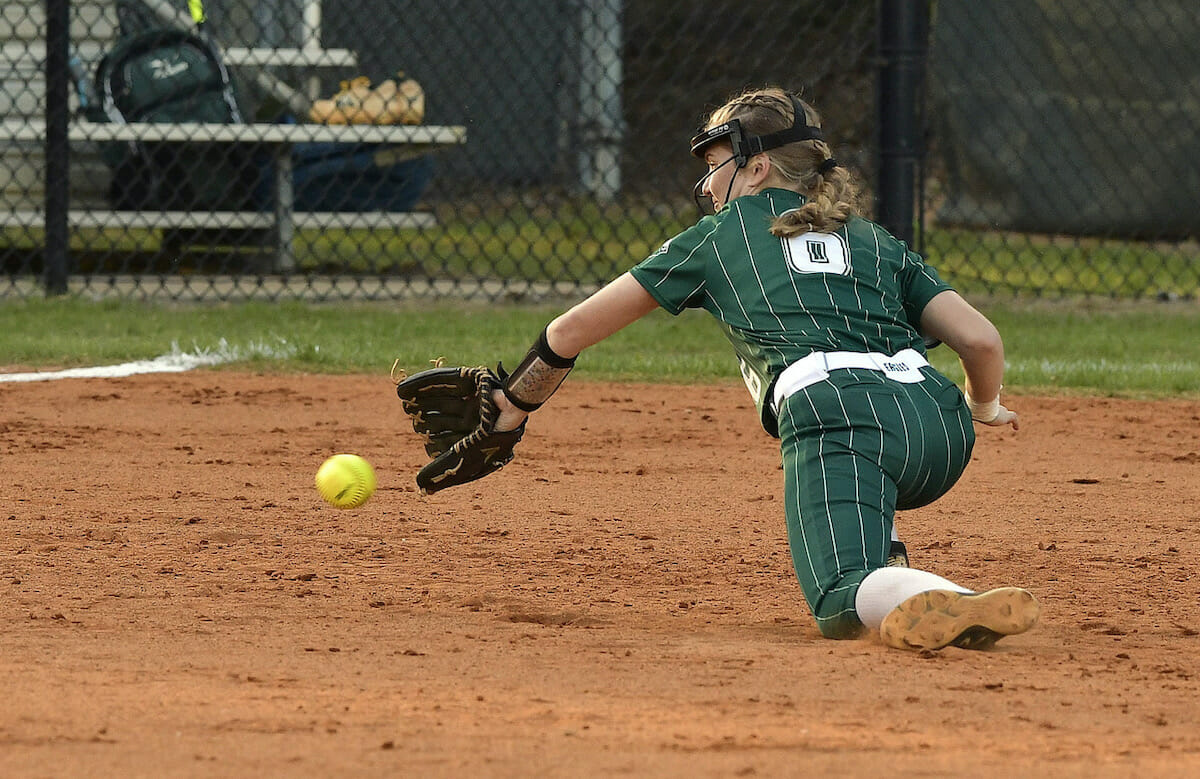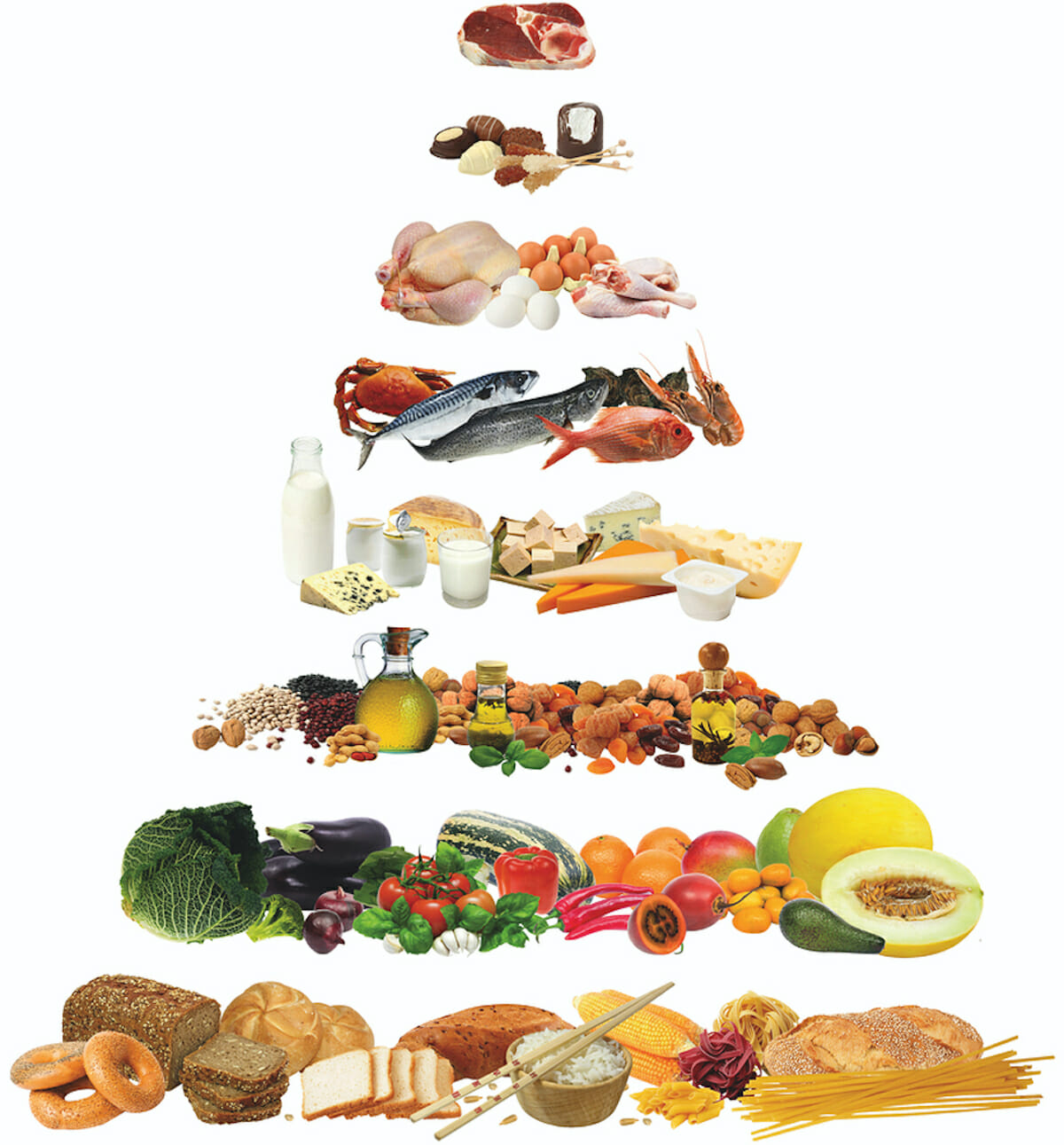Heading to the park or duck pond to feed the ducks is a very old and popular family pastime; it’s a fun, free activity and a great way for parents and children to see and appreciate wildlife and nature.
What may seem like a fun and harmless pastime is very bad for waterfowl.
Most people don’t realize that bread, rolls, chips, and other human “snack food” items do not offer the proper nutrition that ducks and geese need—and that the act of feeding a diet heavy in breads and other empty carbohydrates can lead to severe health consequences and a variety of other problems.
Wild ducks and geese feed on a variety of grains and grasses, aquatic plants, and invertebrates, all naturally found in the wild. When eaten in combination, these foods are nutritionally balanced and provide everything a wild duck or goose needs to survive. In contrast, foods commonly fed to waterfowl in public parks, such as bread, crackers, popcorn, and corn, are typically low in protein and essential nutrients and minerals (such as calcium and phosphorus). While a single feeding of these “junk foods” may not harm waterfowl, it adds up! If everyone visiting a park “only” gives a few pieces of bread or crackers to ducks and geese, it quickly becomes the bulk of what wild waterfowl consume, and results in a variety of nutritional disorders.
Ducks, geese and other waterfowl in public parks are often admitted to wildlife rehabilitation centers with metabolic bone disease (MBD). Birds with MBD have incredibly soft bones and joints that are often malformed and fractured; these injuries are caused by an overall calcium deficiency in the body, which is linked to an inappropriate diet. Calcium also plays a crucial role in the formation of eggs/offspring, clotting ability, cardiovascular and neuromuscular function, and a variety of other metabolic activities. Birds with MBD are often so malformed they cannot fly and become dependent on handouts, completing a vicious cycle. Affected birds are typically too weak to compete for food and defend themselves and are often the victims of aggressive attacks by other ducks and geese.
Another common issue with ducks and geese in public parks is “angel wing”—a condition where the ends of an affected bird’s flight feathers are twisted upward. “Angel wing” occurs when ducks and geese grow abnormally quickly; the affected birds’ joints don’t fully form as the wing and feathers develop and the weight of the growing feathers rotates the tip of the bird’s wing. If caught in initial stages, waterfowl suffering from this condition may be treated with splints to guide bone growth in the correct position. Although there are several theories regarding the causes of “angel wing”, some studies suggest that diets high in protein may be to blame. Well-meaning citizens feeding commercial duck, chicken, or turkey feed to avoid the “junk food” may be unintentionally creating this disorder.
One more problem with bread products is that this type of food expands in water—and the stomach—which gives ducks and geese an artificial feeling that they are full. As a result, these birds may not feel motivated to continue foraging on natural foods of higher nutritional value.
Habitat Degradation
There are also environmental issues related to artificially increasing the number of ducks and geese in each area. Larger numbers of waterfowl in a small area can seriously impact the surrounding environment.
Feces generated by overcrowded waterfowl, especially in a pond that has poor water flow, result in increased deposition of carbon, phosphorus, and nitrogen in the water and surrounding grasslands. The addition of these nutrients to water (a process known as eutrophication) promotes excessive algae growth, leading to decreased oxygen levels, foul-smelling green and cloudy water, fish kills, and an overall decrease in water quality. Some common algae species (blue-green algae) even produce toxins associated with illness in wildlife, humans, and pets.
Certain species of waterfowl may also be destructive to the environment, due to their natural foraging strategies. Canada geese graze on grass and other low-growing plants and, when in large flocks, often destroy lawns and gardens surrounding city ponds. If these birds cannot find enough food, they often migrate short distances to golf courses, sports fields, and other grassy public areas yet still use the public park as a “home base”. Increased waterfowl populations can also lead to erosion of shorelines and a general negative public opinion of ducks and geese.
In the wild, a healthy fear of humans and other potential predators allows ducks and geese to survive and reproduce. In public settings where waterfowl are fed artificial diets, these birds often lose this fear and are more likely to be consumed by predators (feral cats, dogs, alligators, raccoons, etc). Urban waterfowl may also be more likely to be hit by vehicles, entangled in litter, and maliciously harmed by humans. Habituated geese can pose a significant public health threat at certain times of the year if they are defending a nesting female or a brood of goslings. These habituated geese can seriously hurt humans, particularly children.
Allowing ducks and geese to find their own wild, nutritionally balanced diet is best—for the health of waterfowl and the surrounding environment.
For those who would like to slowly stop feeding waterfowl: the least problematic foods mimic the waterfowl’s natural diet—greens and insects. Chopped up greens [kale, collards, dandelions (only from pesticide-free yards)] are more nutritious than any junk food, including corn. Ducks and geese eat insects too—so a special treat of mealworms or freeze-dried crickets would also likely be enjoyed! But the bottom line is that wild ducks and geese should be able to find plenty of food on their own—so if you can resist the temptation to feed, simply pack your binoculars and camera and enjoy watching the birds.
Instead of feeding ducks and geese:
Pick up trash at your local park.
Collect stray fishing hooks, lines, and sinkers.
Learn more about native ducks and geese and their natural history.
Spread the word! Share this information with others. If your local park/duckpond has a problem with feeding, contact your parks and recreation office and work together to put up educational signs. In Beaufort, SC contact Parks Supervisor at 843- 470-3513.
Sources: https://www. wildlifecenter.org/problem-feeding-ducks
https://www.reconnectwithnature. org/news-events/the-buzz/dont-feed-ducks-geese-bread












